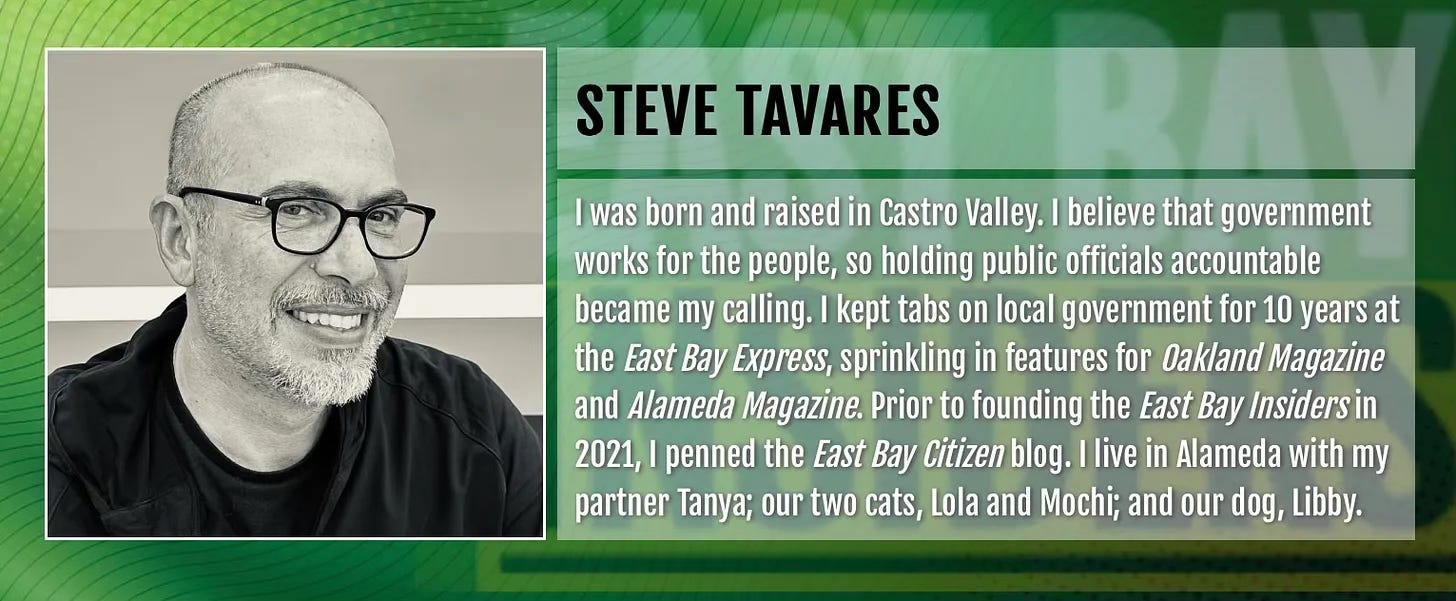Memorial Day medley
A sampling of insights from Alameda, Oakland, San Leandro, Pleasanton, East Bay MUD, and the FBI probe
SAN LEANDRO
Sooner than later, San Leandro politics is going to be completely upended by the FBI public corruption investigation that bled from Oakland into San Leandro earlier this year. If any of the allegations that San Leandro Councilmember Bryan Azevedo, himself, voiced in a television interview come to light as part of the FBI’s investigation, there will invariably be calls for him to resign. Azevedo, though, has been steadfast in his innocence, but he’s also counting down the days until he’s arrested, he told ABC7 last month. But what happens if indictments are handed down, perhaps this summer, and he refuses to resign? He can’t be forced to relinquish his seat. Only a recall can do that, and that might be the next step. But the most likely initial reaction, if charges are laid out by the FBI, would be the entire city council issuing a call for him to resign.
FBI PROBE
Disgraced former Oakland Mayor Sheng Thao has a high-priced lawyer in Jeffrey Tsai. Most doubt Thao has the personal finances to afford such a legal eagle. So who’s paying for it? It’s a private matter, so the type of transparency seen on the public and campaign sphere is not available. It’s probably not Thao footing the bill. Sometimes attorneys see high-profile cases as an opportunity to raise their public and professional profile. If Tsai helps Thao avoid prosecution, then future clients will line up for his services. There is some conjecture that wealthy progressive individuals are paying for Thao’s legal representation. While an interesting thought, it doesn’t seem like a good return on investment. No matter the outcome of Thao’s legal problems, she’s likely done with politics.
OAKLAND
Barbara Lee is Oakland’s new mayor, but her chief of staff Miya Saika Chen, could be the most important person for making good on campaign promises for steadying the ship. Lee made a good choice in selecting someone already deeply immersed in palace intrigue at Frank Ogawa Plaza. As a former chief of staff under Council President Nikki Fortunato Bas, Chen should be comfortable within the gears of power. That’s good because there’s indications that Chen will be the point person on some of the city’s biggest problems, including housing and homelessness.
EAST BAY MUD
At the end of the day, the burgeoning controversy at the East Bay Municipal Utility District may turn into something bigger than the actual allegation. An artist hired by the district to display a Black History Month installation, alleged in March that East Bay MUD Board Director April Chan questioned her use of another director’s parking space, and later claimed the director’s behavior was racially motivated. Marguerite Young, the president of the East Bay MUD board, called for an independent investigation of the interaction. It’s increasingly likely that what began as a dispute over a parking space will ultimately be about a clash of personalities between Young and Chan. Unlike others in this type of situation, Chan has forcefully fought back. At a meeting earlier this month, Chan accused Young of retaliation. A number of public speakers accused Young of targeting the board’s lone Asian American. Chan may sue the district, and a delay of the independent investigation only ensures the board is spending time on this controversy rather than maintaining the region’s water supply.
PLEASANTON
By day, Pleasanton Mayor Jack Balch is a CPA. His acknowledgement to residents last week that recently prescribed fiscal belt-tightening in Pleasanton will last a few more years is easy to deliver to a client. But the same advice is certainly going to test the patience of Pleasanton voters. Balch showed his political acumen is strong during his four-year term as a councilmember. Retail politics is also his strength as evidence by his upset last fall of the incumbent mayor. Nevertheless, the pursuit of fiscal austerity in Pleasanton is politically risky, even though, right now, it appears to be the will of voters who torpedoed a half-cent sales tax last November. Invariably anything and everything that goes wrong in Pleasanton will be blamed on the city administration.
ALAMEDA
Hayward begrudgingly went through the process of shifting from at-large council elections to the district-based variety last year. San Leandro is doing the same this summer. In both cases, the impetus came from outside City Hall through a complaint letter asserting at-large elections in these cities violates the California Voting Rights Act. There’s one big fish left for clever attorneys looking to take advantage of the lucrative loophole—Alameda. There’s really no way for a city to avoid succumbing to district-based elections once the dreaded complaint letter is sent. So why wait for it? Just begin the process of creating council districts and sort out the specifics on your own.
There’s one reason why Alameda’s progressive/left-leaning establishment has their heads in the Crown Beach sand in hopes that district-based elections are not forced upon them. Alameda has pockets of moderate-to-conservative voters, including Bay Farm Island, that could possibly create districts that threaten the left-leaning majority on the five-member city council. In addition, a council district that includes the former Naval Air Station could be ripe for a moderate candidate. The rest of Alameda has a tendency to propose undesirable development and events for the West End. With council districts, the West End would have a single voice. As it is now, there’s five councilmembers who have a to-do list for the entire island.







